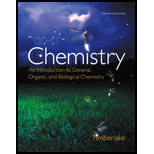
Chemistry: An Introduction to General, Organic, and Biological Chemistry (12th Edition) - Standalone book
12th Edition
ISBN: 9780321908445
Author: Karen C. Timberlake
Publisher: PEARSON
expand_more
expand_more
format_list_bulleted
Concept explainers
Textbook Question
Chapter 4, Problem 4.90AQAP
Write the name and
a. 36
b. 22
c. 48
d. 26
e. 54
f. 78
g. 83
h. 92
Expert Solution & Answer
Want to see the full answer?
Check out a sample textbook solution
Students have asked these similar questions
Show work with explanation needed. don't give Ai generated solution
Show work. don't give Ai generated solution
None
Chapter 4 Solutions
Chemistry: An Introduction to General, Organic, and Biological Chemistry (12th Edition) - Standalone book
Ch. 4.1 - Write the symbols for the following elements. a....Ch. 4.1 - Prob. 4.2QAPCh. 4.1 - Prob. 4.3QAPCh. 4.1 - Prob. 4.4QAPCh. 4.1 - Prob. 4.5QAPCh. 4.1 - Prob. 4.6QAPCh. 4.2 - 4.7 Identify the group or period number described...Ch. 4.2 - Prob. 4.8QAPCh. 4.2 - Prob. 4.9QAPCh. 4.2 - 4.14 Using TABLE 4.4, identify the function of...
Ch. 4.2 - Prob. 4.11QAPCh. 4.2 - 4.10 Give the symbol of the element described by...Ch. 4.2 - Prob. 4.13QAPCh. 4.2 - Identify each of the following elements as a...Ch. 4.3 - Identify each of the following as describing...Ch. 4.3 - 4.18 Identify each of the following as describing...Ch. 4.3 - What did Rutherford determine about the structure...Ch. 4.3 - 4.20 How did Thomson determine that the electrons...Ch. 4.3 - Prob. 4.19QAPCh. 4.3 - Is each of the following statements true or false?...Ch. 4.3 - Prob. 4.21QAPCh. 4.3 - 4.24 Sometimes clothes cling together when...Ch. 4.4 - 4.25 Would you use the atomic number, mass...Ch. 4.4 - 4.26 Identify the type of subatomic particles...Ch. 4.4 - Prob. 4.25QAPCh. 4.4 - Prob. 4.26QAPCh. 4.4 - Prob. 4.27QAPCh. 4.4 - Prob. 4.28QAPCh. 4.4 - Prob. 4.29QAPCh. 4.4 - Prob. 4.30QAPCh. 4.5 - What are the number of protons, neutrons, and...Ch. 4.5 - 4.34 What are the number of protons, neutrons, and...Ch. 4.5 - Write the atomic symbol for the isotope with each...Ch. 4.5 - Prob. 4.34QAPCh. 4.5 - Argon has three naturally occurring isotopes, with...Ch. 4.5 - Strontium has four naturally occurring isotopes,...Ch. 4.5 - Prob. 4.37QAPCh. 4.5 - Prob. 4.38QAPCh. 4.6 - Electrons can move to higher energy levels when...Ch. 4.6 - Prob. 4.40QAPCh. 4.6 - Prob. 4.41QAPCh. 4.6 - Prob. 4.42QAPCh. 4.6 - Prob. 4.43QAPCh. 4.6 - 4.50 Write the electron arrangement for each of...Ch. 4.6 - Prob. 4.45QAPCh. 4.6 - Prob. 4.46QAPCh. 4.7 - What is the group number and number of valence...Ch. 4.7 - 4.54 What is the group number and number of...Ch. 4.7 - Prob. 4.49QAPCh. 4.7 - Write the group number and draw the Lewis symbol...Ch. 4.7 - Prob. 4.51QAPCh. 4.7 - Prob. 4.52QAPCh. 4.7 - Prob. 4.53QAPCh. 4.7 - Prob. 4.54QAPCh. 4.7 - Prob. 4.55QAPCh. 4.7 - 4.62 Select the element in each pair with the...Ch. 4.7 - Prob. 4.57QAPCh. 4.7 - Prob. 4.58QAPCh. 4.7 - Prob. 4.59QAPCh. 4.7 - Prob. 4.60QAPCh. 4.7 - Prob. 4.61QAPCh. 4.7 - Prob. 4.62QAPCh. 4.7 - Prob. 4.63QAPCh. 4.7 - 4.70 Fill in the following blanks using higher or...Ch. 4.7 - Prob. 4.65QAPCh. 4.7 - Prob. 4.66QAPCh. 4.7 - Prob. 4.67QAPCh. 4.7 - 4.74 Which statements completed with a to e will...Ch. 4 - Prob. 4.69UTCCh. 4 - Use Rutherford’s gold-foil experiment to answer...Ch. 4 - Prob. 4.71UTCCh. 4 - Prob. 4.72UTCCh. 4 - Prob. 4.73UTCCh. 4 - Prob. 4.74UTCCh. 4 - Prob. 4.75UTCCh. 4 - Prob. 4.76UTCCh. 4 - Prob. 4.77UTCCh. 4 - Prob. 4.78UTCCh. 4 - Match the spheres A through D with atoms of Li,...Ch. 4 - Prob. 4.80UTCCh. 4 - Prob. 4.81UTCCh. 4 - Of the elements Sn, Xe, Te, Sr, I, and Rb,...Ch. 4 - Prob. 4.83AQAPCh. 4 - Prob. 4.84AQAPCh. 4 - Prob. 4.85AQAPCh. 4 - Prob. 4.86AQAPCh. 4 - Prob. 4.87AQAPCh. 4 - Prob. 4.88AQAPCh. 4 - Prob. 4.89AQAPCh. 4 - Write the name and symbol of the element with the...Ch. 4 - Prob. 4.91AQAPCh. 4 - Prob. 4.92AQAPCh. 4 - Prob. 4.93AQAPCh. 4 - Prob. 4.94AQAPCh. 4 - Prob. 4.95AQAPCh. 4 - Prob. 4.96AQAPCh. 4 - Prob. 4.97AQAPCh. 4 - Prob. 4.98AQAPCh. 4 - Prob. 4.99AQAPCh. 4 - Prob. 4.100AQAPCh. 4 - Why is the ionization energy of Ca higher than K,...Ch. 4 - Prob. 4.102AQAPCh. 4 - Prob. 4.103AQAPCh. 4 - Of the elements F, Br, Cl, and I, which (4.7) a....Ch. 4 - Prob. 4.105CQCh. 4 - Prob. 4.106CQCh. 4 - Prob. 4.107CQCh. 4 - Prob. 4.108CQCh. 4 - Prob. 4.109CQCh. 4 - Prob. 4.110CQCh. 4 - Prob. 4.111CQCh. 4 - Prob. 4.112CQ
Knowledge Booster
Learn more about
Need a deep-dive on the concept behind this application? Look no further. Learn more about this topic, chemistry and related others by exploring similar questions and additional content below.Similar questions
arrow_back_ios
SEE MORE QUESTIONS
arrow_forward_ios
Recommended textbooks for you
 Chemistry: Principles and ReactionsChemistryISBN:9781305079373Author:William L. Masterton, Cecile N. HurleyPublisher:Cengage Learning
Chemistry: Principles and ReactionsChemistryISBN:9781305079373Author:William L. Masterton, Cecile N. HurleyPublisher:Cengage Learning

Chemistry: Principles and Reactions
Chemistry
ISBN:9781305079373
Author:William L. Masterton, Cecile N. Hurley
Publisher:Cengage Learning
Precipitation Reactions: Crash Course Chemistry #9; Author: Crash Course;https://www.youtube.com/watch?v=IIu16dy3ThI;License: Standard YouTube License, CC-BY